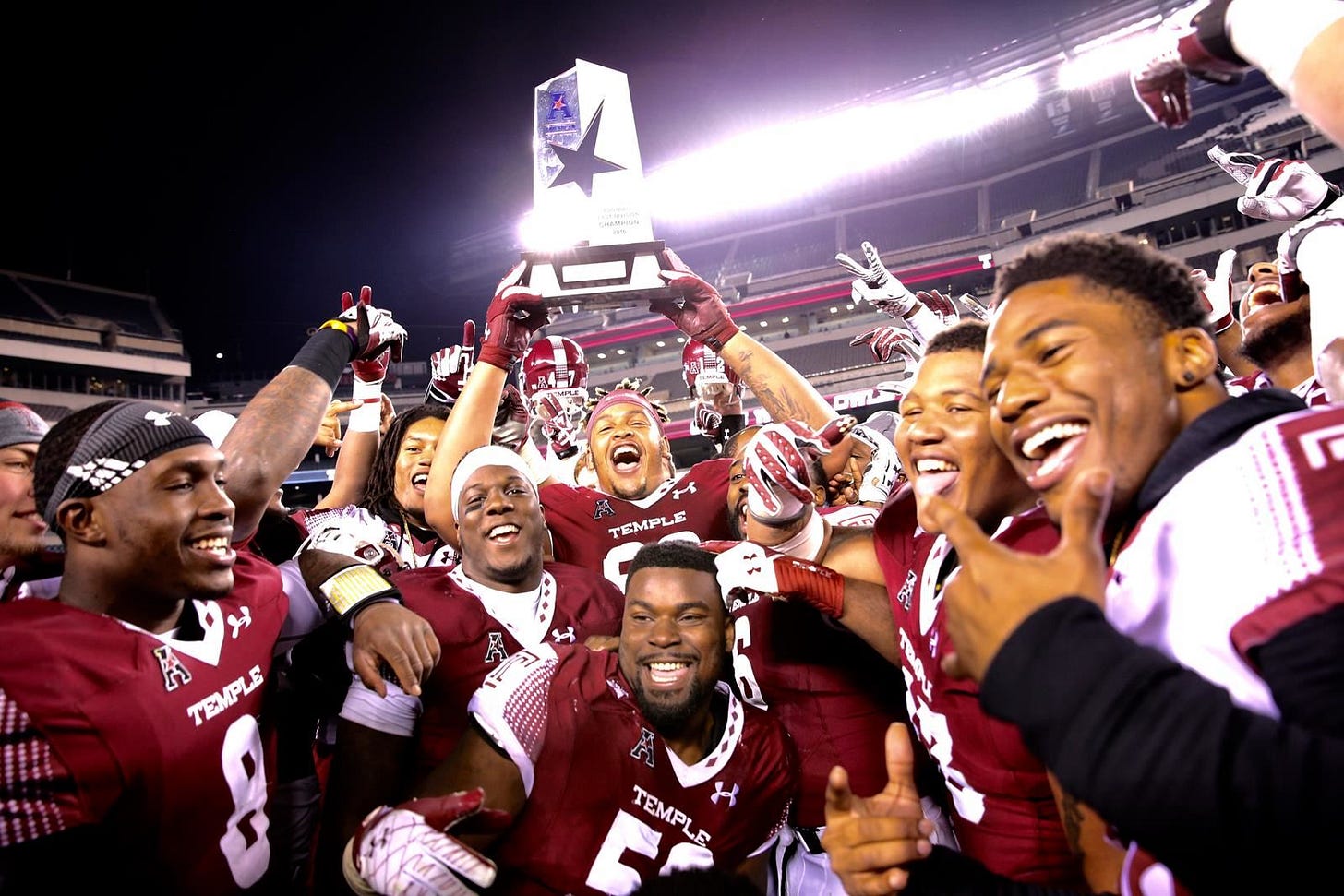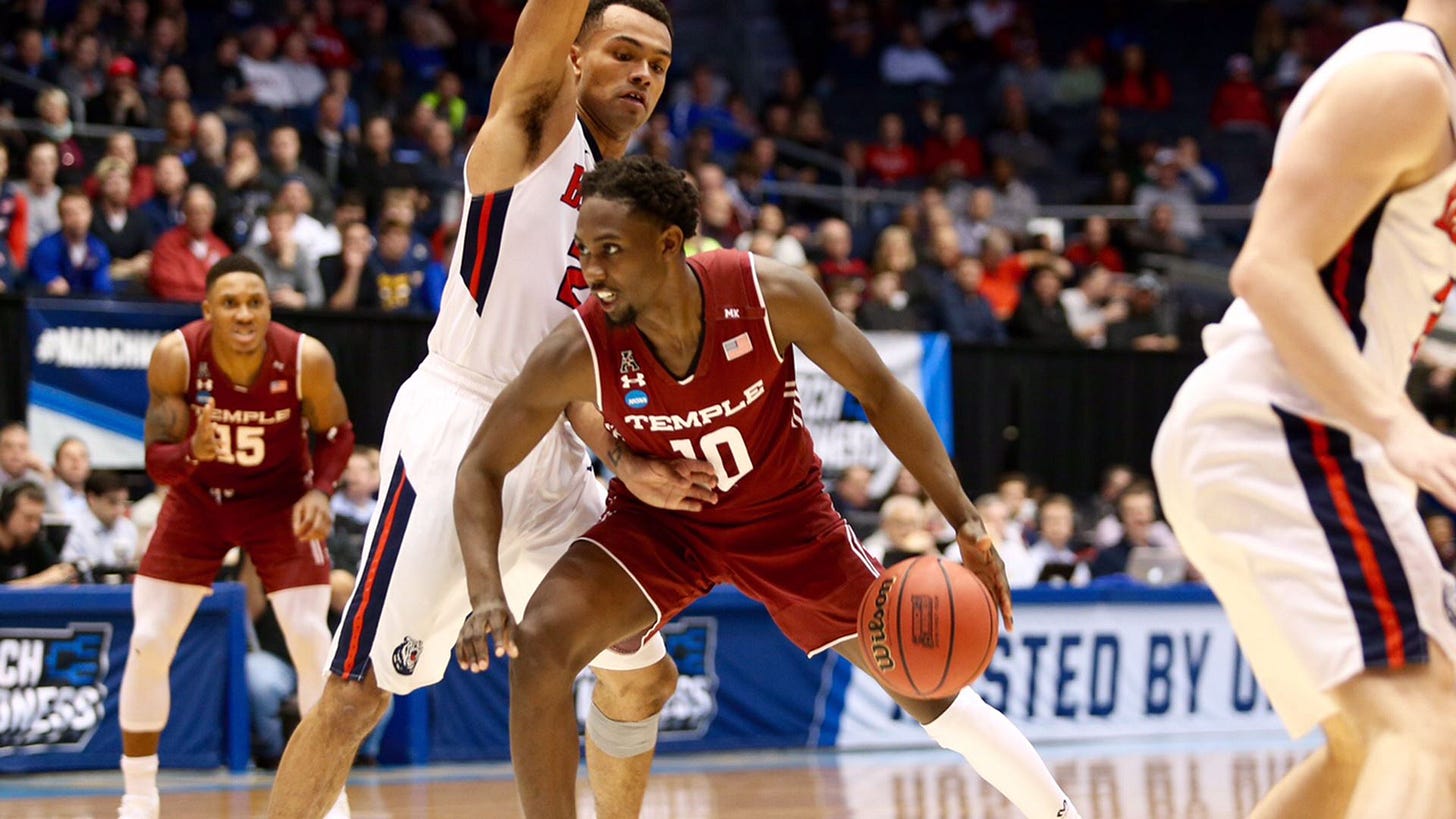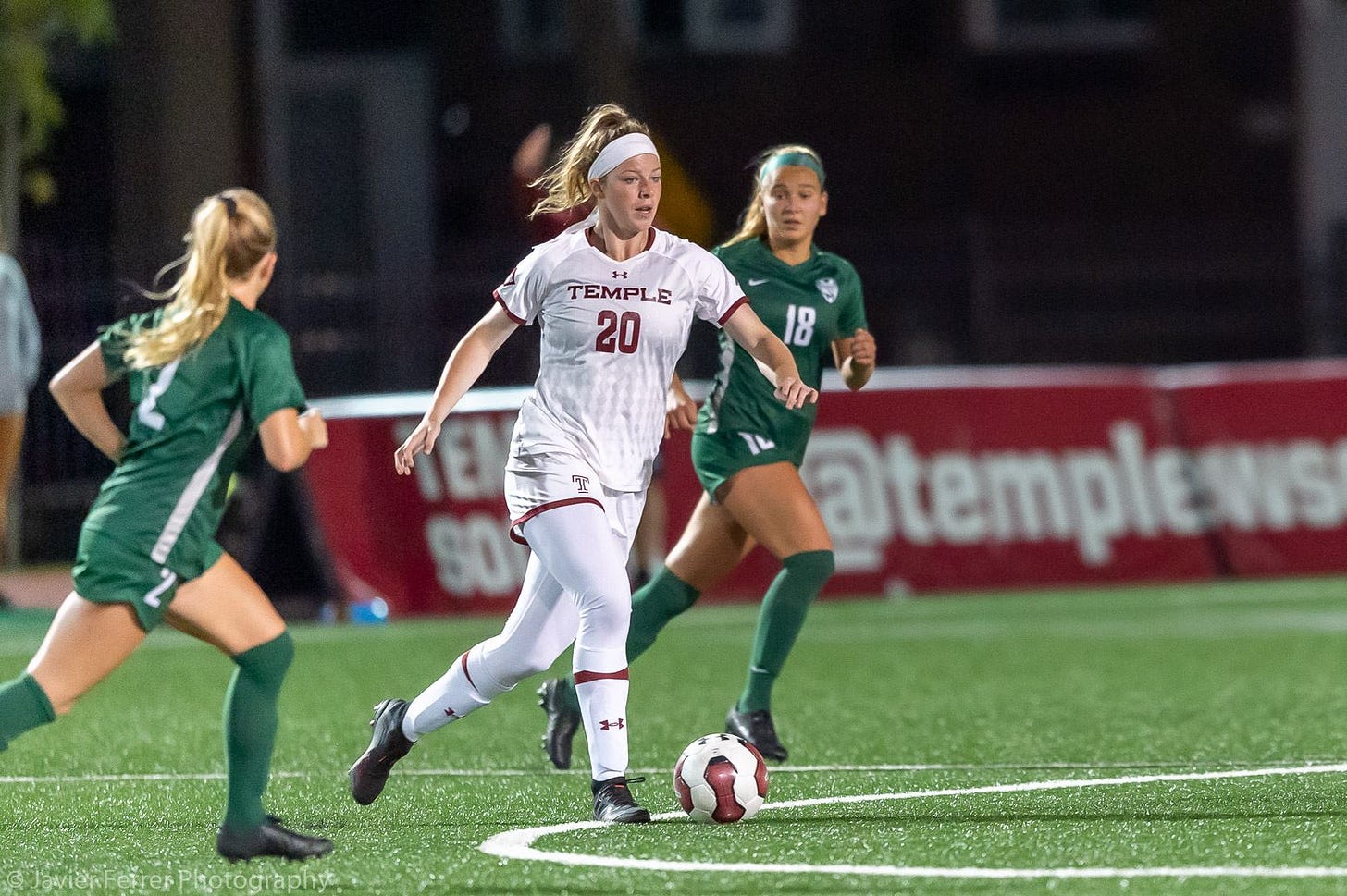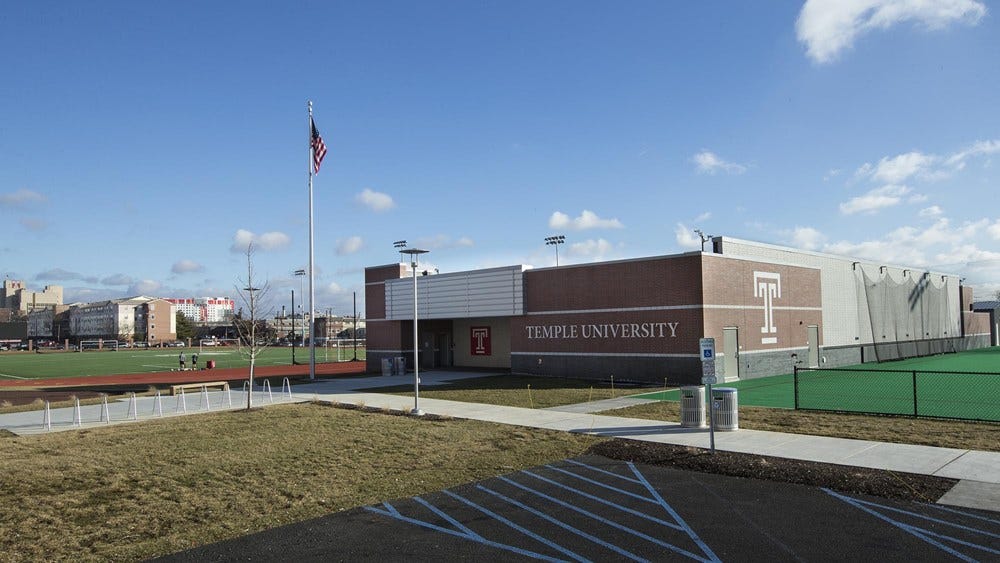What Kind of AD Is BC Getting in Temple’s Patrick Kraft?
After five years as Temple’s AD, Patrick Kraft was named the new Boston College Director of Athletics on Wednesday morning. A good, but very different, hire.

In June 2018, Temple athletic director Patrick Kraft was reportedly one of the finalists for the Maryland AD job—in fact, a week before Damon Evans was hired, The Washington Post said that Kraft was the frontrunner for the post. Then, back in March of this year, Kraft was among six candidates considered to replace Fred Glass as the new AD of Indiana, where Kraft played football and ultimately obtained three degrees. But Scott Dolson won out.
Kraft had become a recurring guest on short lists for vacant AD positions. On Wednesday morning, however, he finally found his new home.
Kraft was named the new Boston College Director of Athletics, as first reported by Pete Thamel of Yahoo! Sports. The 43-year-old will replace Martin Jarmond, who was hired away by UCLA two weeks ago after three years in Chestnut Hill. Kraft agreed to what’s reported to be a five-year deal, effective July 1. In the meantime, associate athletic director JM Caparro will continue to serve as the school’s interim AD.
“I am truly honored to be selected to serve Boston College as the steward of such a great intercollegiate athletics department,” Kraft said, per BC Athletics.
“The core values of Boston College are in alignment with how I live my life and how I approach my job, creating world-class experiences for student-athletes with the utmost of integrity, character, faith and love.”
Kraft’s Background
While at Indiana, Kraft walked on to the football team and eventually earned a scholarship. He furthered his education in Bloomington, receiving both a master’s in athletic administration and a doctorate in sports management by 2008. Kraft then took on the role of senior assistant director for marketing at Indiana from 2009-11 before serving two years as the executive senior associate athletics director at Loyola Chicago—a Jesuit school, like BC.
Kraft taught at each of those schools, instructing a sport marketing and management class at Indiana and serving as a clinical professor in the School of Business Administration at Loyola Chicago. In 2013, he moved to Temple. Kraft was brought to Philadelphia along with two other former Indiana administrators—Neil Theobald became Temple’s new president and Kevin Clark was named AD. As for Kraft, he began his Temple career as deputy AD.
It was only two years before he was handed the keys to Temple Athletics.
Kraft raised the bar for Temple football—what does that mean for BC?
Many BC fans instinctively associate Temple football with Steve Addazio. After all, it was Addazio’s rebuild in Philly that landed him the head coaching gig at BC. But Temple’s real turnaround happened after that—during Kraft’s five-year tenure.
In that span, Temple posted a 43-24 record, logged back-to-back 10-win seasons—both of which saw the Owls crack the AP Poll (which Temple hadn’t done since 1979)—produced 15 NFL draftees (the same number as BC), and made five consecutive postseason appearances. To put that in perspective, Temple hadn’t clinched back-to-back bowls before. Ever. Oh, and in Matt Rhule’s final year as head coach, the Owls won their first conference championship since 1967.

Once Rhule—now the head coach of the Carolina Panthers—left for Baylor, Kraft brought in Geoff Collins to fill the void. But after 15 wins and what was Temple’s second bowl victory in 29 years, Collins was hired away by Georgia Tech. Kraft rebounded, first by making a big splash with the hire of Miami defensive coordinator Manny Diaz.
Diaz, the architect of the “turnover chain,” coached a Hurricanes unit that finished each of his three seasons in Coral Gables inside the top 30 in scoring defense and ranked as high as second in the nation in total yards allowed per game (2018). Even though Diaz ditched Temple for the head coaching job at Miami 18 days later—following the resignation of Mark Richt—Kraft recovered, hiring Rod Carey. The former Northern Illinois head coach led Temple to a 8-5 record with ranked wins over Maryland and eventual conference champion Memphis this past season.
Kraft won’t have to make another football hire anytime soon. With former Ohio State co-defensive coordinator Jeff Hafley at the helm, BC appears to be set for the foreseeable future. What he can do is pick up where Jarmond left off, in regard to attendance and brand building.
In 2015, the year that Kraft took over as Temple’s AD, the football program posted the season’s biggest jump in attendance among FBS schools, going from an average crowd of 23,370 to 44,159. Admittedly, that meteoric rise can largely be attributed to Temple’s breakout 10-win season and long-awaited return to the AP Poll. But that same year, Temple hosted ESPN’s famous pre-game show College GameDay for the first time in school history—a feat that often requires ADs from suitor schools to market their universities and programs.
Kraft, a former player himself, has proven his football chops. For BC, a school looking to return to its mid-2000s ACC title contending status, that has to be encouraging.
Temple basketball enjoyed success, too
While Temple football struggled for much of the 2000s and early 2010s, its basketball programs flourished. In fact, both have made the NCAA Tournament nine or more times this century. That’s not to say that they haven’t had their fair share of ups and downs, though. When Kraft took over as the Owls’ AD, the men’s and women’s teams were coming off NIT appearances.
The following year, the men’s team returned to the NCAA Tournament on the back of 21 wins, including a 14-4 mark in conference play, Temple’s best single-season AAC record. After a couple of .500 seasons, it worked its way back into the field of 68, in large part thanks to the guard trio of Shizz Alston Jr., Quinton Rose, and Nate Pierre-Louis. But, in what was Fran Dunphy’s 13th and final season as Temple’s head coach, the 23-9 Owls lost to a fiery Belmont team in the First Four. After the season, Kraft replaced Dunphy with former Temple basketball star and Philadelphia 76ers Sixth Man of the Year Aaron McKie. In his first year, McKie coached Temple to a 14-17 record.

The first two years Kraft was Temple’s AD, the women’s team was one of the best in the AAC. A 23-12 showing in 2015-16 was followed by a 24-8 season the next year, one in which Temple entered the Top 25 for the first time since 2005-06. Consequently, head coach Tonya Cardoza and the Owls earned their first NCAA Tournament bid in five years. But that trip to the postseason was short-lived. Temple was bounced in the first round of the dance, and has posted a combined 39-53 record in their last three seasons.
BC’s women’s team doesn’t need a rebuild. ACC Coach of the Year Joanna Bernabei-McNamee just guided the Eagles to their best record since 2010-11 and had them in the running for their first NCAA Tournament appearance in 14 years. BC’s men’s team is a different story. Despite having two NBA guards during Jim Christian’s six-year stay—including the school’s first-ever lottery pick—the Eagles only have a NIT appearance to show for it. Christian was signed to a two-year extension through the 2021-22 season after BC’s 19-win 2017-18 NIT campaign. The Eagles have since gone 27-36 while the ACC as a whole has regressed. Only five ACC teams were projected to make the 2020 NCAA Tournament. In 2017 and 2018, the league sent nine to the tourney. Twelve Eagles players recruited by Christian have transferred away from the program, with the most notable being Jairus Hamilton—a forward who arrived at BC in 2018-19 as the Eagles’ first ESPN 100 recruit since Craig Smith in 2002.
Effort was dedicated to Olympic sports, but results varied
Kraft oversaw locker room renovations and facility upgrades for Temple’s Olympic sports. The resource allocation was there for the most part, and a handful of the school’s non-revenue sports performed admirably. Temple volleyball finished 47th in NCAA RPI in 2016, its highest ranking since 2002, and the following year made it to postseason play (WNIVC) for the first time in 15 years. Men’s soccer made its way into the Top 25 amid Kraft’s first semester as AD, something the program hadn’t done since 1997. And women’s gymnastics rewrote the record books in 2016-17, tallying its 10-best scores in program history.
But a few other Olympic sports didn’t fare too well, especially toward the end of Kraft’s tenure. Temple field hockey was a combined 28-65 in Kraft’s five years. After Marybeth Freeman’s fourth season as head coach, Kraft went in a different direction and hired Stonehill College’s Susan Ciufo, who went 7-10 in her first year with the Owls (2019). Following back-to-back 10-plus win seasons in 2014 and 2015, the women’s soccer team has nosedived—the Owls were 33-53-9 while Kraft was Temple’s AD. Kraft finally moved on from Seamus O’Connor in January of this year, when he hired Nick Bochette. The former Albany head coach led the Great Danes to both a American East regular season and tournament championship in 2018, the second season of his three-year stint with the team.

Even sports like women’s lacrosse and men’s soccer, which registered double-digit win seasons in Kraft’s first two years on the job, have been in a bit of a rut lately. In each of their last three seasons, those teams are 20-23 and 22-26-7, respectively. BC has been behind the eight ball in football and basketball, but the Eagles’ Olympic sports have been holding down the fort much of the past decade. Kraft will have to try to maintain that level of excellence.
Fundraising, Facilities, and Academics
Kraft will inherit “Greater Heights,” a $150 million capital campaign started by Jarmond in 2018, designed to enhance the student-athlete experience and BC’s national profile. Over a four-year period, Kraft saw athletics fundraising at Temple increase by 75 percent, reeling in multiple six and seven-figure donations in support of football, the men’s and women’s rowing programs—which were nearly cut in 2013—and the Temple Owls Sports Complex, which plays host to Temple’s men’s and women’s soccer, lacrosse, field hockey, and track teams.
Other facilities that were restored or created during Kraft’s five-year run include the East Park Canoe House (boathouse for men’s and women’s rowing), as well as new practice facilities for men’s golf, men’s and women’s rowing, and women’s fencing. Temple’s Olympic sports also received locker room renovations. Additionally, Temple Athletics unveiled a new Student Training and Recreation Complex in the fall of 2017, equipped with a 10,000 square foot weight and cardio areas, not to mention an indoor turf field and a two-lane outdoor track.

There’s no question BC prides itself on its academic reputation. Kraft showed at Temple that he valued student-athletes’ performance outside of the classroom and directed resources to improving the university’s student-athlete academic support center while installing a student-athlete lounge in January 2018 for studying, interaction, and relaxation. The results have been impressive. In 2019, Temple led all AAC schools and ranked 14th nationally in Academic Performance Rate public recognition, and a school record 76.5 percent of student-athletes earned a 3.0 GPA or higher in the spring semester of that year.
Kraft’s fan engagement at Temple looked different than Jarmond’s at BC
Jarmond was only at BC for three years, but you’d be hard-pressed to find someone in the campus community who didn’t know who he was. In his first and a half month on the job, he sent out 51 tweets, 18 more than his predecessor, Brad Bates, did during his final year as AD (2016-17). Jarmond tweeted about BC Athletics, the university, and its students till his last day in office, even after he took the position at UCLA. Social media was integral to his marketing strategy, and it allowed him to engage with fans, especially those scattered across the country. Of course, he also established his own BC clothing line, organized a fan council, created a ridesharing partnership with Lyft, expanded alcohol sales at Alumni Stadium and Conte Forum, and even greeted tailgaters to better the gameday experience.

As of now, Kraft doesn’t even have a Twitter account. What he has done, though, is create services such as OwlsTV—a digital and social media-driven video program—to keep Temple fans up to date and enthusiastic about their varsity teams. It wouldn’t be surprising to see Kraft follow in Jarmond’s footsteps with a Twitter profile, but whether or not that works to the effect of Jarmond’s will be measured by Kraft’s social media aptitude and willingness to connect with students, alumni, and fans on a day-to-day basis.
Bottomline
In 2016, Kraft was honored as one of the top 40 sports executives under the age of 40. He’s also a member of the NCAA Football and Oversight and Football Competition committees. His resumé speaks for itself. Unlike Jarmond, Kraft wasn’t hired by BC as a first-time AD. He’s coming in with experience and Jesuit ties.
That said, he’s not the eye-catching hire that Jarmond—then, the youngest AD in the Power Five and BC’s first-ever black AD—was three years ago. And he’ll be making a leap from the AAC to the ACC, from a school with 19 varsity teams to a 9,000-student private university with 31, where connectivity is all the more important.
Jarmond restored enthusiasm in BC Athletics that had been missing for years. Kraft will have to take the baton and not only maintain fan engagement, but also continue BC’s return to ACC prominence, starting with football and basketball.
Featured image courtesy of Jessica Griffen/The Philadelphia Inquirer
Other images courtesy of Temple Athletics





